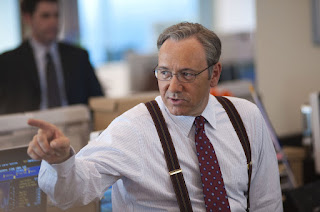In 2008, a New York City investment bank goes through a round of layoffs. On the same day, risk analyst Peter Sullivan (Zachary Quinto) uses data provided by laid-off risk manager Eric Dale (Stanley Tucci) to uncover a looming crisis of worthless investment assets about to bankrupt the bank - and the entire industry. Peter alerts his boss Will Emerson (Paul Bettany) and trading floor manager Sam Rogers (Kevin Spacey), who quickly advise their boss Jared Cohen (Simon Barker) and chief of risk management Sarah Robertson (Demi Moore).
By the middle of the night CEO John Tuld (Jeremy Irons) is convening meetings to plot out a survival strategy. Jared supports a "first out" plan to dump the toxic assets onto the unsuspecting market the very next morning, financially saving the bank but damaging its reputation and triggering a market crash. Loyal to the bank but perturbed by the immorality of ordering his team to sell soon-to-be worthless assets, Sam is less enthusiastic about the plan.
A fictional account inspired by real events and most closely resembling what may have happened at investment bank Goldman Sachs, Margin Call unfolds like a gripping play. Director and writer J.C. Chandor introduces a few outdoor scenes, but the focus is on 36 critical hours inside the bank's offices, where analysts, managers, and executives suddenly come face to face with an existential worst-case scenario. Through their actions, Chandor teases out some hard truths about capitalism.
With diverse personalities generating impressive dynamics, this is a thriller about the flow of information and the essence of grasping criticality and then acting, including meetings convened at 2am. Sullivan is no less than a rocket scientist (literally), who chose a Wall Street career because the money is better. His manager Will is a realist; his boss Sam is a motivator. Up the ladder at the level of Jared and ultimately Tuld, the whys and details don't matter: only the trends, implications, and necessary next steps.Chandor avoids the trap of simplistically portraying Wall Street bankers as profit-hungry vultures. Self-deprecation is in evidence, as is recognition of long-term boom and bust cycles. Trading in debt-saddled assets is described as the lubrication keeping the economy afloat and juicing the dream. Will eloquently describes the ethics of economic fairness to young risk analyst Seth (Penn Badgley):
If people want to live like this, with their big cars and these houses that they haven't even paid for, then you are necessary. The only reason they can continue to live like kings is because we've got our fingers on the scale in THEIR favor. And if I were to take my finger off...then the whole world gets really fucking fair, really fucking quickly. And no one wants that, they say they do...but they don't.
All Ace Black Movie Blog reviews are here.



No comments:
Post a Comment
We welcome reader comments about this post.